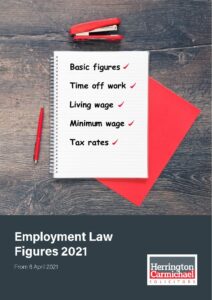The recent case of David Seccombe v Reed in Partnership Ltd in the Employment Appeal Tribunal decided that a Tribunal was right to conclude that the Claimant was not disabled as he was unable to demonstrate that his mental impairment was long term and, even if he was disabled, the employer did not know, and could not reasonably have known, about the impairment.
Background
Prior to the Claimant’s employment with the Respondent, the Claimant had suffered two short-term episodes of ill-health but neither was deemed to be long-term. When the Claimant commenced his employment with the Respondent, he was required to complete an equal opportunities questionnaire which asked him to confirm if he had any health-related issues or impairments for which the Respondent would be required to make any reasonable adjustments. The Claimant did not disclose any mental health impairment in this questionnaire and therefore the Respondent was not aware of his previous history.
The Claimant’s employment was subject to the satisfactory completion of a nine month probationary period. There had been concerns about his performance early on and he was subject to several performance review meetings where it was decided that his probationary period should be extended. At no point during these performance review meetings did the Claimant raise any mental health impairment and his sickness record was good.
The Claimant then suffered a severe traumatic event and he commenced a period of absence due to a breakdown he suffered as a result. The Respondent was aware of the impact this traumatic event had on the Claimant’s mental health.
Following a short absence, the Claimant was deemed fit to return to work and the Respondent had believed that the issue had been resolved.
Shortly following his return to work, the Claimant attended his quarterly review meeting where it was decided that he would be dismissed on the grounds of his poor performance.
The Claimant contended that the dismissal amounted to disability discrimination as he was a disabled person at the material time and the Respondent was aware of the Claimant’s disability.
Employment Tribunal Decision
The Employment Tribunal held that the Claimant was not a disabled person at the relevant time and his claim was dismissed.
To meet the requirements of the Equality Act 2010, the onus is on the Claimant to show they have a physical or mental impairment which has a substantial and long-term adverse effect on their ability to carry out normal day to day activities during the period of employment. The Claimant had failed to show that his mental impairment was ‘long-term’ as the effects of his breakdown only lasted a few months before he had returned to work
The Respondent also needed to have known, or be reasonably expected to know, that the Claimant was disabled. Even if the Claimant was disabled, he had not raised this during his employment and had confirmed the opposite in his equal opportunities questionnaire. Therefore, the Tribunal found that the Respondent did not know and could not reasonably have been expected to know that the Claimant was disabled.
The Claimant appealed this decision on the grounds that the Tribunal’s decision was perverse.
The EAT’s Decision
The EAT upheld the Tribunal’s ruling and concluded that there was no perversity in the Tribunal’s decision.
In the judgment, the EAT noted the following in determining whether the Claimant was disabled:
- The requirement that a disability must be long term relates to the effect of the impairment as opposed to the impairment itself. Therefore, an impairment must have a substantial adverse effect on day-to-day activities (including work activities) to be deemed long-term.
- What an individual does and does not say about their impairment should be taken into account when assessing if an employee is disabled at the relevant time as they will be best placed to explain the effect their impairment has on their day-to-day activity. For instance, if there is no medical evidence for a period of time but an employee informed a family member or employer of the effects of their condition, this would be relevant to determining if they are disabled. The EAT concluded that this was a matter of fact and degree and not law.
Comment
Whilst this decision will be welcomed by employers, it is wise for employers to continually be on the lookout for any signs that their employees might have a disability and ensure they establish the reasons for any period of absence to give employees every opportunity to make their employer aware of their condition.
If you have any questions about the law surrounding disabilities in the workplace, please do get in touch.
For further information or to discuss the issues raised by this update, please contact our Employment Group on 0118 977 4045 or employment@herrington-carmichael.com.
Click here to see our ‘Employment Law Figures 2021’ which includes basic figures, time off work, living wage, minimum wage and tax rates.

This reflects the law at the date of publication and is written as a general guide. It does not contain definitive legal advice, which should be sought as appropriate in relation to a particular matter.








